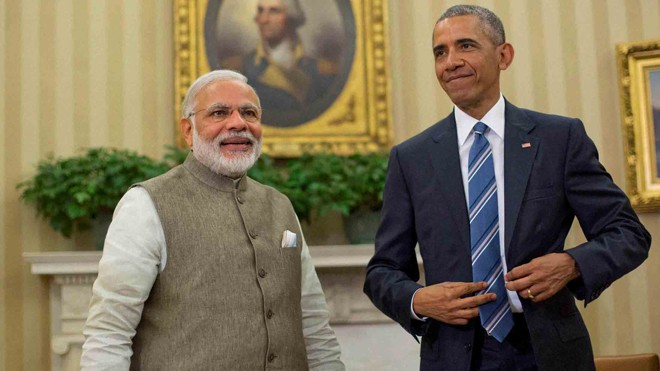
Big powers have urged India and Pakistan to solve the Kashmir question bilaterally

Pakistan has been trying to make the world take notice of the human rights violations in the Indian Occupied Kashmir and solve the issue according to the UN resolutions.
World powers like the US and Russia have been reluctant though to play a decisive role. They have on more than one occasion urged the two neighbours to decide the matter between themselves.
While the absence of a direct involvement of the world community on the Kashmir issue could be a win-win situation for India, Pakistan has been trying its best to internationalise the issue.
It was in this context that Pakistan briefed China about the human rights violations in Kashmir during their seventh bilateral strategic dialogue in Beijing a few days ago.
Pakistan’s Foreign Secretary, Aizaz Ahmad Chaudhry, apprised Chinese Foreign Minister Wang Yi of the "grave humanitarian situation" in Kashmir and the ongoing "human rights violations," hoping that the international players like China would play their role in calling on India to put an end to blatant human rights violations in the Valley.
Experts on international relations and diplomacy have critically evaluated the role of the regional and international powers on the Kashmir issue between India and Pakistan.
Even the recent gross human rights violations have not helped the world powers to stand up for the Kashmiris. Talat Masood, senior analyst points to that. He laments that "The brutalities and gross human rights violations that are occurring in Indian held Kashmir should have awakened the world conscience, but for expedient reasons are overlooked by world powers."
Masood explains the US’s approach towards recent uprising in Kashmir in the current international scenario, "For America, India is a close strategic partner that is being supported to countervail China’s growing influence. Statements emanating from the US since the uprising in Kashmir took a turn for the worse remain guarded and words chosen by the official spokesperson are generally advisory and neutral in nature."
Masood says that "United States emphasis all along has been on bilateralism, but the reality is that India refuses to engage in any serious or meaningful dialogue on Kashmir."
Read also: Editorial
He points to the unconvincing remarks made by Indian Prime Minister Narendra Modi, "As of now India is hiding behind the cover of talking only on "terrorism" and is deflecting world attention by highlighting and making false comparisons with the low level insurgency by Baloch dissident elements." He, however, adds that, "Washington’s position on Balochistan remains clear that it is an integral part of Pakistan."
He notes that "Russia has always supported India on the Kashmir issue and its official position has not changed so far despite improved relations with Pakistan. The only noticeable difference is that it not as vocal about it."
He evaluates the Chinese stance on Kashmir, "As a matter of policy China is supportive of Pakistan’s position on Kashmir and sides with it at the international forums. Beijing insists that Kashmiris living in India while visiting China be treated differently. In the past it has, however, been advising Pakistan to keep the Kashmir issue on the back burner and address its other priorities first."
So how do we compare the US and Russian policy on Kashmir? Dr Hasan Askari Rizvi, political analyst, makes a distinction between the Russian policy on Kashmir and, before that, the Soviet Union’s policy on Kashmir. He believes "Russia advises both Pakistan and India to address the Kashmir problem and other contentious issues through bilateral talks. As both countries possess nuclear weapons, Russia does not want tension to escalate between Pakistan and India."
He goes back into history. "Russia’s original policy on Kashmir goes back to the days of the Soviet Union when it supported Indian position on Kashmir. As Pakistan joined the US sponsored regional alliances in the context of the Cold War in 1954-55, the Soviet Union publicly endorsed India’s position on Kashmir."
But that changed afterwards, "The Soviet Union held-back public endorsement of India’s position in 1965-1970 and it facilitated the signing of the Tashkent Declaration (January 1966) that gave a framework for normalization of relations between Pakistan and India after the September 1965 war."
In Rizvi’s view, Russia today wants a bilateral solution of the Kashmir issue between India and Pakistan, "After the end of the Cold War and the break-up of the Soviet Union (December 1991), Russia has generally maintained that India and Pakistan should themselves find a peaceful solutions of the Kashmir and other problems."
He explains the US’s position on Kashmir too, "The US is not supportive of Pakistan’s demand that the UN should enforce its resolutions for holding a plebiscite in Kashmir. It does not apply any pressure on India to hold talks with Pakistan. It only suggests to both countries to negotiate a solution of the Kashmir problem."
Like Russia, he says, "The US concern on Kashmir flows from the notion that it could be a flashpoint for a nuclear exchange in the region. The US’s main concern is that the tension between India and Pakistan should not escalate to the point that a conventional war breaks out between them which could later escalate to a nuclear war."
Rizvi adds, "Therefore, the US current strategy is to make sure no war breaks out between Pakistan and India. Beyond that it does not want to get involved in Pakistan-India problems. It only encourages both countries to keep tension within manageable limits and find out an acceptable solution of the Kashmir problem through a bilateral dialogue."